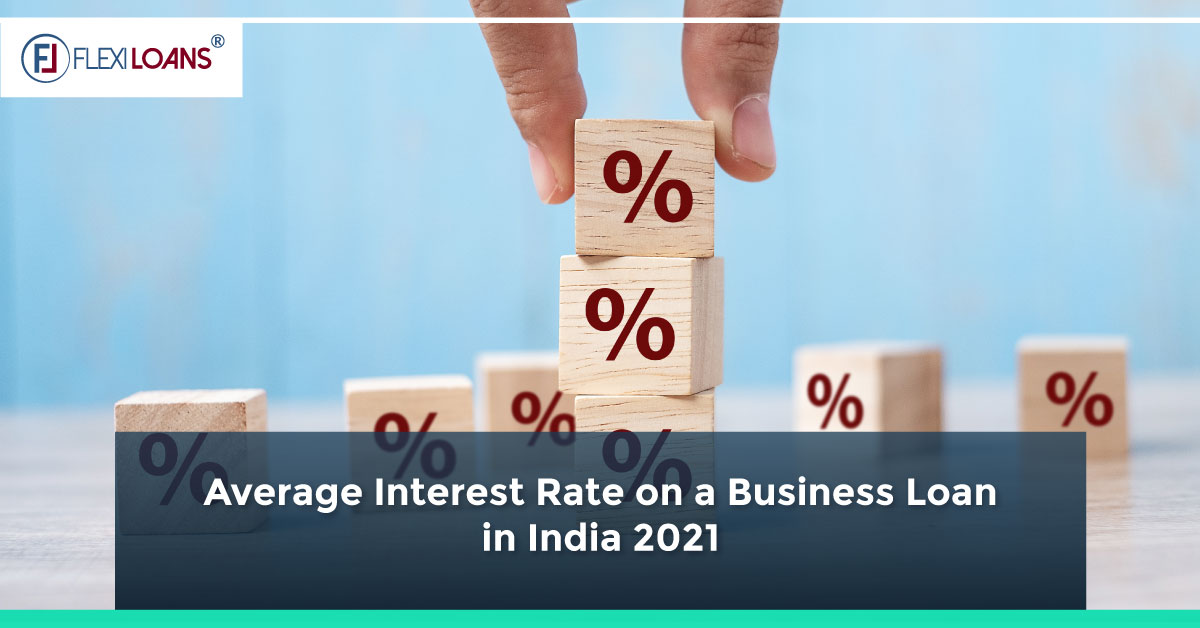Jul 17, 2021

Starting your own business could be cumbersome if your finances are not well-planned. One of the ways to raise capital for your business is by taking SME Business loans from banks or NBFC (Non-Banking Financial Corporation) in India.
In India, the Average interest rate on a business loan is 16.6%. Since it usually ranges from 11.2% to 22%.
The interest rate for a business loan in India could vary depending on various other factors such as
- Applicant’s Profile
- Credit score
- Required loan amount
- Repayment tenure
- Business plan
- Business operational years
- Annual profits
Business Loan Interest Rate Comparison
Choosing the right bank or NBFC to fund your business is paramount while curating your business plan. So, let’s plunge into the business loan interest rate comparison of various banks and NBFC in India.
| Banks | Interest rate per annum (%) | Max Loan Amount (₹) | Repayment Tenure (Months) |
| HDFC | 16% onwards | 75 lakhs | 6-48 |
| AXIS | 15% onwards | 50 lakhs | 12-36 |
| Kotak Mahindra Bank | 15% onwards | 75 lakhs | 6-48 |
| ICICI | 18% onwards | 40 lakhs | 6-48 |
| RBL Bank | 19% onwards | 20 lakhs | 12-36 |
| IDFC First | 20% onwards | 75 lakhs | 12-60 |
| SBI | 11.2% onwards | 100 lakhs | 12-48 |
| NBFC | Interest rate per annum (%) | Max Loan Amount (₹) | Repayment Tenure (Months) |
| FlexiLoans | 12% onwards | 50 Lakhs | 12-36 |
| Bajaj Finserv | 17% onwards | 50 Lakhs | 12-48 |
| Fullerton Finance | 18% onwards | 100 Lakhs | 3-36 |
| Lending Kart Finance | 18% onwards | 25 Lakhs | 12-36 |
| Hero Fin Corp | 18% onwards | 50 Lakhs | 12-36 |
| IIFL Finance | 18% onwards | 50 Lakhs | 12-36 |
| Tata Capital Finance | 18% onwards | 30 Lakhs | 12-36 |
| ZipLoan | 18% onwards | 50 Lakhs | 6-24 |
| NeoGrowth Finance | 18% onwards | 75 Lakhs | 6-24 |
| HDB Financial Service | 22% onwards | 30 Lakhs | 12-60 |
The above table indicates the interest rate per annum, Maximum loan amount, and repayment tenure of business loans of banks and NBFC. Business loan interest rate starts from 11.2 % onwards and could reach up to 22% depending upon your business profile and business requirements.
While finalizing a business loan in India, one must also keep an eye on charges levied by banks or NBFC apart from the business loan rate of interest and tenure of repayment.
| Bank/NBFC | Processing Fee | Foreclosure Charges/ Pre-payment |
| FlexiLoans | 2% to 2.5% of the loan amount | Nil |
| SBI | 1% of the sanctioned limit | Varies from loan-loan |
| HDFC Bank | Up to 2.50% of the loan amount | Up to 4% of outstanding amount |
| Tata Capital | It depends on the applicant’s profile and business requirements | Foreclosure: 5% of Principal loan outstanding |
| Bajaj FinServ | Up to 2% of the loan amount | Part-payment: 2% on the amount part-paid |
| RBL Bank | Up to 3% of the loan amount | No foreclosure permitted before repayment of 6 EMI’s |
| IDFC First Bank | Up to 3.5% of the loan amount | Foreclosure: 5% of Principal loan outstanding |
| Lending kart Finance | Up to 3% of the loan amount | Nil |
The above comparisons will give you a holistic view of different banks and NBFC business loans that will enable you to make tangible decisions for selecting business loans that will be the right fit for you.
FlexiLoans provide an unsecured business loan up to 1 Crore with the lowest interest rate starting from 1% for the tenure of 36 months. FlexiLoans is the best option if you are planning for a business loan.
Which Factors Affect Business Loan Rate of interest?
1. Type of Business
The banks/NBFC generally bifurcates the business loan under “Priority Sector” and “Non-Priority Sector.” Business Loans that come under Non-Priority Sector have a higher interest rate than the priority sector loans. Therefore, the nature of your business determines your business loan rate of interest.
2. Business Operational Years
Long business operational years will give you brownie points while availing business loans. However, lenders kept the cap of 2 years of business operational period irrespective of the nature of your business. More business operational years would fetch you less interest rate on business loans.
3. Annual Turnover
The annual turnover of your business indicates whether your business is making profits or incurring losses. In a nutshell, it remains a crucial factor in determining your business loan eligibility. There might be times when the turnover is infrequent. However, having financial consistency is crucial, as it assists your lender in deciding the business loan interest rate, loan amount, and repayment terms.
4. Credit Score
A credit score indicates your financial credibility and is based upon your credit transactional history. It depends on timely repayment of EMI, credit card bills, and loan repayment – a good credit score will bestow you more benefits like lower business loan interest rates and flexible tenure or repayment terms. The credit score managed by TransUnion CIBIL is authentic and preferable by banks and NBFCs in India for business loans.
5. Collateral
You can get a business loan without collateral which acts as a substantial guarantee or security against your loan repayment to the lenders. The high value of the collateral would fetch you more benefits. High valuable collateral such as real estate, equipment, machinery, deposits, or home equity provides security to the bank. After examining the collateral, the bank might avail you of a higher loan amount with a low interest rate of business loans as the risk is low.
6. Lender Type
A business loan rate of interest may vary from one lender to another. If you closely compare business loan interest rates offered by banks and NBFCs, you will observe that banks levy lower interest rates than NBFCs.
How to Get a Low Interest Rate Business Loan in 2021?
- Maintain the good financial health of your business.
- Elevate your credit score and try to achieve 750.
- Improve your credibility by timely paying bills, EMIs, and credit card payments.
- Maintain an adequate source of income.
- Have a strong relationship with the bank by opening an account and timely repayment of EMI.
- Do not close any credit card or any bank account.
Different Types of Interest Rates on Business Loans
1. Diminishing or Reducing Balance Rate
The reducing balance rate is being calculated each month on the remaining loan amount. The EMI comprises interest payable for outstanding loan amount for every month along with the principal amount repayment. After every EMI payment, the outstanding amount of the loan gets reduced. Hence, the interest rate for the consequent month would be the calculation of interest applicable only on the outstanding amount.
2. Fixed Rate of Interest
Fixed interest rate is being calculated on full loan amount during its tenure. The interest is charged without considering the monthly EMIs that would slump the principal amount and the business loan rate of interest.
Smart Way to Use Your Business Loan Effectively
After procuring a business loan, it is crucial to spend that amount wisely and in such a way that will create assets for your business rather than a liability.
1. Recruitment of Smart People
Hiring smart and hard-working people will assist you and your business grow exponentially with time. Investing in human resources will fetch you the best investment return as they will help you solve critical business-related problems and hence save your business from substantial losses. Recruiting smart employees will also assist you in making decisive financial decisions for your business. For example, they would help you to choose the best yet low business loan rate of interest.
2. Website Upgradation
Having an interactive website would help your business to reach millions of people online. It will gravitate customers to your business purpose; consequently, your product/service would disseminate to an even larger audience in no less time.
3. Growth via Digital Marketing
Digital marketing is at the forefront in the 21st-century era. Investment in digital marketing will help your business regularly engage with customers and will also assist in building strong customer relationships. It will help you to get adequate feedback which will be valuable to build better products or services.
4. Software Upgradation
With the latest technologies, your business can strive for higher growth since better software or SaaS would increase your business productivity and efficiency. Investments in tech tools will also improve your product and service, which ultimately could serve a larger audience.
5. Better Office Space
Having a spacious and well-designed office would gravitate more clients towards your company and help your teamwork in a sound and professional environment.







